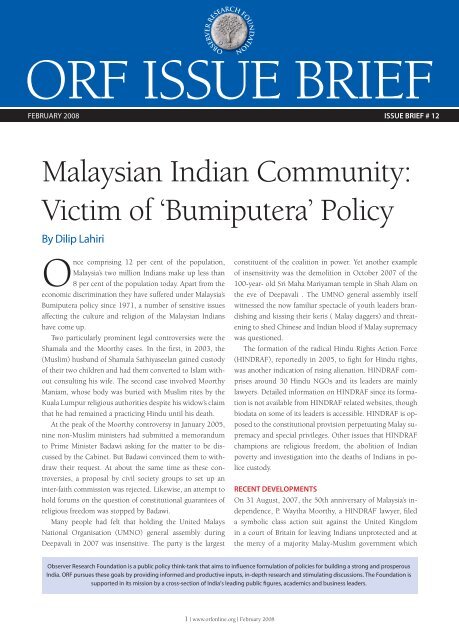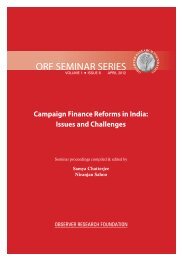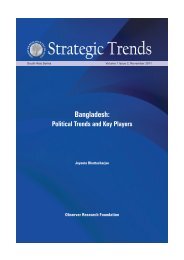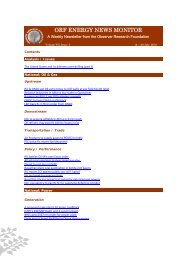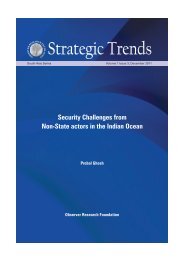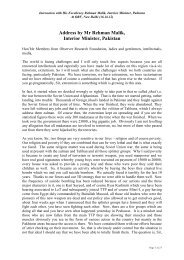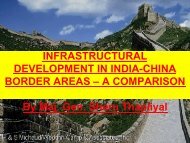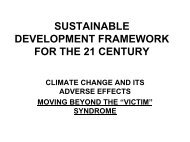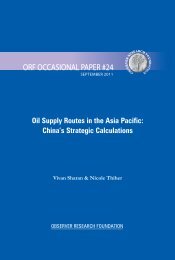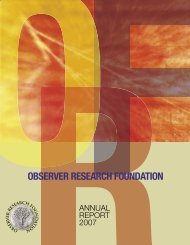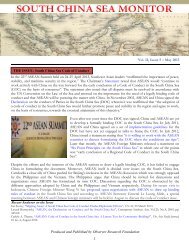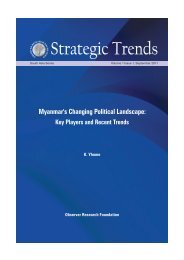Malaysian Indian Community: Victim of 'Bumiputera' Policy
Malaysian Indian Community: Victim of 'Bumiputera' Policy
Malaysian Indian Community: Victim of 'Bumiputera' Policy
Create successful ePaper yourself
Turn your PDF publications into a flip-book with our unique Google optimized e-Paper software.
Observer Research Foundation<br />
ISSUE BRIEF ● MALAYSIAN INDIAN COMMUNITY: VICTIM OF ‘BUMIPUTERA’ POLICY<br />
ORF ISSUE BRIEF<br />
FEBRUARY 2008 ISSUE BRIEF # 12<br />
<strong>Malaysian</strong> <strong>Indian</strong> <strong>Community</strong>:<br />
<strong>Victim</strong> <strong>of</strong> ‘Bumiputera’ <strong>Policy</strong><br />
By Dilip Lahiri<br />
Once comprising 12 per cent <strong>of</strong> the population,<br />
Malaysia’s two million <strong>Indian</strong>s make up less than<br />
8 per cent <strong>of</strong> the population today. Apart from the<br />
economic discrimination they have suffered under Malaysia’s<br />
Bumiputera policy since 1971, a number <strong>of</strong> sensitive issues<br />
affecting the culture and religion <strong>of</strong> the <strong>Malaysian</strong> <strong>Indian</strong>s<br />
have come up.<br />
Two particularly prominent legal controversies were the<br />
Shamala and the Moorthy cases. In the first, in 2003, the<br />
(Muslim) husband <strong>of</strong> Shamala Sathiyaseelan gained custody<br />
<strong>of</strong> their two children and had them converted to Islam without<br />
consulting his wife. The second case involved Moorthy<br />
Maniam, whose body was buried with Muslim rites by the<br />
Kuala Lumpur religious authorities despite his widow’s claim<br />
that he had remained a practicing Hindu until his death.<br />
At the peak <strong>of</strong> the Moorthy controversy in January 2005,<br />
nine non-Muslim ministers had submitted a memorandum<br />
to Prime Minister Badawi asking for the matter to be discussed<br />
by the Cabinet. But Badawi convinced them to withdraw<br />
their request. At about the same time as these controversies,<br />
a proposal by civil society groups to set up an<br />
inter-faith commission was rejected. Likewise, an attempt to<br />
hold forums on the question <strong>of</strong> constitutional guarantees <strong>of</strong><br />
religious freedom was stopped by Badawi.<br />
Many people had felt that holding the United Malays<br />
National Organisation (UMNO) general assembly during<br />
Deepavali in 2007 was insensitive. The party is the largest<br />
constituent <strong>of</strong> the coalition in power. Yet another example<br />
<strong>of</strong> insensitivity was the demolition in October 2007 <strong>of</strong> the<br />
100-year- old Sri Maha Mariyaman temple in Shah Alam on<br />
the eve <strong>of</strong> Deepavali . The UMNO general assembly itself<br />
witnessed the now familiar spectacle <strong>of</strong> youth leaders brandishing<br />
and kissing their keris ( Malay daggers) and threatening<br />
to shed Chinese and <strong>Indian</strong> blood if Malay supremacy<br />
was questioned.<br />
The formation <strong>of</strong> the radical Hindu Rights Action Force<br />
(HINDRAF), reportedly in 2005, to fight for Hindu rights,<br />
was another indication <strong>of</strong> rising alienation. HINDRAF comprises<br />
around 30 Hindu NGOs and its leaders are mainly<br />
lawyers. Detailed information on HINDRAF since its formation<br />
is not available from HINDRAF related websites, though<br />
biodata on some <strong>of</strong> its leaders is accessible. HINDRAF is opposed<br />
to the constitutional provision perpetuating Malay supremacy<br />
and special privileges. Other issues that HINDRAF<br />
champions are religious freedom, the abolition <strong>of</strong> <strong>Indian</strong><br />
poverty and investigation into the deaths <strong>of</strong> <strong>Indian</strong>s in police<br />
custody.<br />
RECENT DEVELOPMENTS<br />
On 31 August, 2007, the 50th anniversary <strong>of</strong> Malaysia’s independence,<br />
P. Waytha Moorthy, a HINDRAF lawyer, filed<br />
a symbolic class action suit against the United Kingdom<br />
in a court <strong>of</strong> Britain for leaving <strong>Indian</strong>s unprotected and at<br />
the mercy <strong>of</strong> a majority Malay-Muslim government which<br />
Observer Research Foundation is a public policy think-tank that aims to influence formulation <strong>of</strong> policies for building a strong and prosperous<br />
India. ORF pursues these goals by providing informed and productive inputs, in-depth research and stimulating discussions. The Foundation is<br />
supported in its mission by a cross-section <strong>of</strong> India’s leading public figures, academics and business leaders.<br />
1 | www.orfonline.org | February 2008
ISSUE BRIEF ●MALAYSIAN INDIAN COMMUNITY: VICTIM OF ‘BUMIPUTERA’ POLICY<br />
The UMNO general<br />
assembly witnessed<br />
the spectacle <strong>of</strong><br />
youth leaders<br />
brandishing their<br />
keris (Malay daggers)<br />
and threatening to<br />
shed Chinese and<br />
<strong>Indian</strong> blood if Malay<br />
supremacy was<br />
questioned.<br />
had violated their human rights as a minority . The lawsuit<br />
claimed 4 trillion British Pounds as compensation, and also<br />
sought to strike out Article 153 <strong>of</strong> the <strong>Malaysian</strong> Constitution<br />
which provides for Malay supremacy.<br />
HINDRAF organized a rally on Sunday, 25 November,<br />
2007 to submit a petition at the British High Commission<br />
addressed to Queen Elizabeth II <strong>of</strong> the United Kingdom. <strong>Malaysian</strong><br />
police refused to grant a permit for the rally, and set<br />
up roadblocks along roads leading up to the rally to screen<br />
motorists entering the city centre and identify “troublemakers”.<br />
They also advised the public not to participate in the<br />
rally. Many shops around Kuala Lumpur were closed on that<br />
day for fear <strong>of</strong> trouble from the rally. One day before the rally,<br />
police arrested three HINDRAF lawyers, P. Uthayakumar,<br />
P. Waytha Moorthy and V. Ganabatirau on sedition charges.<br />
Uthayakumar and Ganabatirau posted bail <strong>of</strong> 800 <strong>Malaysian</strong><br />
ringgits each, but Waytha Moorthy refused<br />
bail as a sign <strong>of</strong> protest<br />
On the morning <strong>of</strong> the rally, about<br />
twenty thousand people gathered near<br />
the Petronas Twin Towers, a symbol <strong>of</strong><br />
modern Malaysia in Kuala Lumpur, carrying<br />
life-size portraits <strong>of</strong> Queen Elizabeth<br />
II and Mahatma Gandhi, to indicate<br />
the non-violent nature <strong>of</strong> their protest.<br />
The mostly ethnic Tamil protesters,<br />
apart from calling for reparations<br />
from the United Kingdom for sending<br />
them to Malaysia as indentured labourers<br />
over a century ago, demanded from<br />
the <strong>Malaysian</strong> government business<br />
licenses, better paying jobs, university<br />
scholarships and other privileges reserved<br />
exclusively for native Malays.<br />
Their demonstration was the first by<br />
ethnic <strong>Indian</strong>s on such a large scale<br />
since national independence was achieved in 1957.<br />
Five thousand members <strong>of</strong> the riot police dispatched to<br />
the scene broke up the rally using batons, tear gas and water<br />
cannon with skin irritant chemicals against the unarmed<br />
protestors. 136 persons were arrested. The Sedition Act was<br />
invoked against the arrested HINDRAF activists, though on<br />
the following day, police had to release the detained leaders,<br />
including HINDRAF President Waytha Moorthy, legal<br />
advisor P. Uthayakumar and V.S. Ganapathi Rao for lack <strong>of</strong><br />
any evidence <strong>of</strong> their alleged seditious statements. On 27<br />
November 2007, Prime Minister Badawi stated that the draconian<br />
Internal Security Act (ISA), which allows suspects to<br />
be detained for an indefinite period without charge or trial,<br />
could be used against the demonstrators arrested on 25 November<br />
2007.<br />
Many students also face suspension under the Universities<br />
and University Colleges Act 1971 which prohibits undergraduate<br />
students from taking part in demonstrations.<br />
Under this Act, those arrested and charged in court are<br />
suspended and are allowed to resume their studies only if<br />
the cases against them are dropped or if they are acquitted.<br />
Hence, those who participated in the rally on 25 November,<br />
2007 could face suspension <strong>of</strong> their studies<br />
As noted above, Badawi had earlier warned that his government<br />
would invoke the Internal Security Act against the<br />
demonstrators if needed. The government also attempted<br />
to link the peaceful HINDRAF rally with terrorism via the<br />
media. As <strong>of</strong> 11 December 2007, the HINDRAF leaders had<br />
all been acquitted by the judicial courts due to lack <strong>of</strong> evidence<br />
and the flimsy nature <strong>of</strong> the prosecution case. On that<br />
day, HINDRAF also put out a strongly<br />
worded “18 point demand for <strong>Malaysian</strong><br />
<strong>Indian</strong> rights”. In order to contain<br />
the movement, not being able to charge<br />
them according to valid evidence-based<br />
legal processes, on12 December 2007<br />
Badawi personally signed the detention<br />
letters to imprison the HINDRAF leaders<br />
under the draconian ISA for two<br />
years. The detained HINDRAF leaders<br />
have now gone on hunger strike from<br />
Jan.20, 2008. The police, in turn, has<br />
threatened that the first five arrests<br />
were just the beginning and more could<br />
follow.<br />
Opposition lawmakers have condemned<br />
the police’s alleged excessive<br />
use <strong>of</strong> force against the demonstrators,<br />
who had voiced their grievances in a<br />
peaceful manner. While agreeing that<br />
Tamil grievances run deep, some opposition lawmakers and<br />
civil rights activists were also concerned about the religious<br />
and ethnic character <strong>of</strong> HINDRAF’s movement. Opposition<br />
leader Anwar Ibrahim urged HINDRAF’s leaders to consider<br />
a more balanced and inclusive approach when addressing<br />
Tamil grievances, saying that complaints and grievances<br />
should be directed at Badawi’s coalition government for neglecting<br />
the plight not only <strong>of</strong> <strong>Indian</strong>s but also other ethnic<br />
groups.<br />
BACKGROUND TO THE UNREST<br />
Malaysia, which celebrated 50 years <strong>of</strong> independence from<br />
British colonial rule on 31 August 2007, had a fairly good record<br />
<strong>of</strong> communal harmony all these years. After the violent<br />
2 | www.orfonline.org | February 2008
ISSUE BRIEF ● MALAYSIAN INDIAN COMMUNITY: VICTIM OF ‘BUMIPUTERA’ POLICY<br />
anti-Chinese riots <strong>of</strong> the late 1960’s, there has been no major<br />
ethnic violence in the country.<br />
The <strong>Malaysian</strong> Constitution adopted at the time <strong>of</strong> the<br />
country’s independence from British colonial rule in 1957<br />
provided for special treatment to the Bumiputeras in government<br />
employment and in the matter <strong>of</strong> admission to educational<br />
institutions. In the aftermath <strong>of</strong> the 1969 riots, the <strong>Malaysian</strong><br />
government introduced, in 1971, the New Economic<br />
<strong>Policy</strong> (NEP) to provide affirmative action programmes for<br />
the majority “Bumiputeras” (sons <strong>of</strong> the soil) i.e. ethnic Malays,<br />
in business, education and the civil service to compensate<br />
for their economic and social backwardness. The NEP<br />
used many tactics to give the bumiputera a bigger slice <strong>of</strong><br />
the economic pie. There were government contracts for construction,<br />
the importing <strong>of</strong> foreign cars and other business<br />
opportunities exclusively for bumiputera. Developers were<br />
forced to sell a portion <strong>of</strong> their property<br />
to Malays at a discounted price. Every<br />
public company was obliged to give a<br />
minimum <strong>of</strong> 30% <strong>of</strong> their shares to Malays.<br />
Even jobs in the government were<br />
reserved specially for them. All these<br />
laws were meant to raise the Malay<br />
share <strong>of</strong> equity and to create a whole<br />
new line <strong>of</strong> affluent middle class Malays.<br />
No effective action was taken on<br />
the NEP promise <strong>of</strong> reducing poverty,<br />
even among the Bumiputera.<br />
While there does not appear to be<br />
a bias in favour <strong>of</strong> Bumiputeras in the<br />
matter <strong>of</strong> taxation, instances are repeatedly<br />
cited, without the availability <strong>of</strong><br />
authentic data, pertaining to alleged<br />
racial discrimination against non-Bumiputeras<br />
in many other fields to include:<br />
● allotment <strong>of</strong> business licenses<br />
● closure <strong>of</strong> Tamil primary schools<br />
● award <strong>of</strong> government scholarships<br />
● granting <strong>of</strong> citizenship to <strong>Indian</strong>s<br />
● granting <strong>of</strong> permits for taxis<br />
● allotment <strong>of</strong> shopping lots<br />
● admission to universities<br />
● appointment <strong>of</strong> lecturers<br />
In 1991, the NEP was revised under the New Development<br />
Plan (1991-2000) to achieve further socio-economic<br />
upliftment <strong>of</strong> the Bumiputeras. The same preferential treatment<br />
<strong>of</strong> the majority Malays has continued under the New<br />
Vision <strong>Policy</strong> (2001-2010).<br />
The radical Hindu<br />
Rights Action Force is<br />
opposed to the legal<br />
provision perpetuating<br />
Malay supremacy and<br />
special privileges.<br />
Other issues that<br />
it champions are<br />
religious freedom and<br />
the abolition <strong>of</strong><br />
<strong>Indian</strong> poverty.<br />
The NEP’s success — or lack <strong>of</strong> it — is a subject <strong>of</strong> heated<br />
debate. Although the NEP targeted a 30% share <strong>of</strong> the<br />
economy for the Bumiputera, the figure, according to <strong>of</strong>ficial<br />
government statistics, has never been reached . On the other<br />
hand, a report by the think tank Asian Strategy and Leadership<br />
Institute (ASLI) claimed in October 2006 that Bumiputera<br />
equity in the corporate sector is a lot higher than the<br />
target <strong>of</strong> 30 per cent. Prime Minister Badawi immediately<br />
rejected it as wrong.<br />
It has been claimed by some activists among <strong>Indian</strong> and<br />
Chinese origin <strong>Malaysian</strong>s that the NEP and its successors<br />
have crippled their communities. This is probably an exaggeration,<br />
at least in terms <strong>of</strong> aggregate economic ownership.<br />
Overall, affirmative action policies have not been detrimental<br />
to the Chinese and <strong>Indian</strong>s: <strong>of</strong>ficial statistics indicate that<br />
their absolute poverty has been reduced faster than poverty<br />
among the Bumiputera, and that their<br />
income and share <strong>of</strong> ownership has<br />
grown. This is referred to as the “expanding<br />
pie theory”; the Bumiputera<br />
share <strong>of</strong> the pie would increase, without<br />
reducing the size <strong>of</strong> the non-Bumiputera<br />
slices <strong>of</strong> the pie. However, this<br />
refers to an aggregation <strong>of</strong> the non-Bumiputera<br />
population and does not consider<br />
intra community inequality.<br />
The latent discontent over discrimination<br />
was exacerbated by more recent<br />
religious tension stemming from Malaysia’s<br />
creeping Islamisation. <strong>Malaysian</strong><br />
politics has adopted an increasingly<br />
religious flavour reflected in developments<br />
such as the expansion <strong>of</strong> Sharia<br />
courts vis-à-vis civil institutions. Islam<br />
was always an important component<br />
<strong>of</strong> Malay national identity. Mahatir, the<br />
previous Prime Minister, had declared that Malaysia was an<br />
Islamic state. Malaysia has also vigorously projected its Islamic<br />
personality in external fora. But for the first time in<br />
Malaysia, a religious framework has now been instituted<br />
within the national socio-economic development plan. Islam<br />
Hadhari was recently introduced in the Ninth Malaysia<br />
Plan as a “comprehensive and universal framework for the<br />
nation”. Islam Hadhari, literally translated, means Civilisational<br />
Islam, a theory <strong>of</strong> government based upon the principles<br />
<strong>of</strong> Islam as derived from the Holy Quran. This initiative<br />
has been very much a brainchild <strong>of</strong> current Prime Minister<br />
Badawi, who introduced the concept in 2004, some months<br />
after his ascension to premiership.<br />
For Islam Hadhari to be considered constructive towards<br />
3 | www.orfonline.org | February 2008
ISSUE BRIEF ●MALAYSIAN INDIAN COMMUNITY: VICTIM OF ‘BUMIPUTERA’ POLICY<br />
the government’s stated national unity efforts, it should obviously<br />
be acceptable to all <strong>Malaysian</strong>s. But non-Muslims,<br />
not surprisingly, find it difficult to reconcile to one religion,<br />
in a multi religious and multi ethnic society, as the sole basis<br />
<strong>of</strong> socio-economic development. A spate <strong>of</strong> recent incidents<br />
has served to perpetuate their fears.<br />
In October 2005, a non-Muslim student complained that<br />
she was barred from her university convocation because<br />
she refused to wear the tudung. Early this year, a directive<br />
was issued for all policewomen, Muslim or not, to wear the<br />
tudung for <strong>of</strong>ficial ceremonies. The failure <strong>of</strong> some girls to<br />
wear the tudung resulted in their removal from a school<br />
netball team. There have been recent incidents <strong>of</strong> Hindu<br />
temple cleansing in the Klang Valley, bulldozers completely<br />
obliterating 100-year-old deities. Local authorities want to<br />
prosecute couples for ‘public indecency’ (holding hands) on<br />
the ground that this is un-Islamic. Non<br />
Muslims were told not to use the term “<br />
Allah” while referring to their own gods<br />
in their texts or prayers A forum discussing<br />
the rights <strong>of</strong> religious freedoms<br />
as provided in the Federal Constitution<br />
was recently disrupted.<br />
All this had led to a rather fraught<br />
situation . The <strong>Indian</strong> grassroots agitation<br />
must have been building up for<br />
some time. Yet the HINDRAF groundswell<br />
apparently took the government<br />
and observers completely by surprise<br />
as it was an unexpected challenge to<br />
the <strong>Malaysian</strong> social contract, typically<br />
taken to mean agreement to provide the<br />
non-Malay and other non-indigenous<br />
peoples <strong>of</strong> Malaysia (mostly the <strong>Malaysian</strong><br />
Chinese and <strong>Malaysian</strong> <strong>Indian</strong>)<br />
with citizenship, in return for their unquestioning<br />
acceptance <strong>of</strong> special privileges to the Malays<br />
and indigenous people <strong>of</strong> Malaysia.<br />
ECONOMIC AND SOCIAL SITUATION OF THE<br />
MALAYSIAN INDIAN COMMUNITY<br />
Nearly 85 per cent <strong>of</strong> <strong>Indian</strong> <strong>Malaysian</strong>s are Tamils, and<br />
about 60 per cent <strong>of</strong> them are descended from plantation<br />
workers. Of the eight per cent <strong>Malaysian</strong>s <strong>of</strong> <strong>Indian</strong> origin,<br />
80 per cent are Hindus, 15 per cent Muslims and the rest are<br />
Christians or Sikhs. Tamil or Malayali Muslims go to extraordinary<br />
lengths to deny their <strong>Indian</strong> ancestry, and side with<br />
Malay Muslims rather than <strong>Indian</strong> Hindus to wangle their<br />
way into the bumiputera preserve.. Malaysia’s Sikhs and Gujaratis<br />
also distance themselves from the <strong>Indian</strong> definition<br />
Badawi personally<br />
signed the detention<br />
letters to imprison the<br />
HINDRAF leaders under<br />
the draconian ISA for<br />
two years. The police<br />
has threatened that<br />
the first five arrests <strong>of</strong><br />
<strong>Indian</strong> leaders was just<br />
the beginning and more<br />
arrests could follow.<br />
which has become a metaphor for backwardness.<br />
After the May 13, 1969 anti-Chinese riots in Malaysia, a<br />
new multicultural pact embedded institutionalized racism<br />
in Malaysia’s ‘ethnic democracy’, with guarantees <strong>of</strong> Malay<br />
dominance and preferential treatment, but also paying at<br />
least lip service to combating poverty among all <strong>Malaysian</strong>s.<br />
While median family income <strong>of</strong> <strong>Malaysian</strong> <strong>Indian</strong>s, according<br />
to <strong>of</strong>ficial statistics, is higher than that <strong>of</strong> Bumiputeras,<br />
certain segments <strong>of</strong> the <strong>Malaysian</strong> <strong>Indian</strong> population live in<br />
the direst poverty, and form part <strong>of</strong> the lowest strata in terms<br />
<strong>of</strong> economic ownership. <strong>Indian</strong> origin <strong>Malaysian</strong>s constitute<br />
about 8 per cent <strong>of</strong> the total population, but <strong>of</strong>ficial statistics<br />
say <strong>Indian</strong>s own only 1.2 per cent <strong>of</strong> traded equity (40 per<br />
cent is held by the Chinese). According to HINDRAF, 15 percent<br />
<strong>of</strong> Malaysia’s juvenile delinquents are <strong>Indian</strong>s, about 50<br />
per cent <strong>of</strong> all convicts in prisons in 2004 and 41 per cent <strong>of</strong><br />
the beggars in 2003 were <strong>Indian</strong>s. The<br />
percentage <strong>of</strong> <strong>Indian</strong>s in the civil service<br />
fell from 40 per cent in 1957 to<br />
less than 2 per cent in 2005. According<br />
to <strong>of</strong>ficial records, 30-35 <strong>Indian</strong> origin<br />
<strong>Malaysian</strong>s per 100,000 committed or<br />
attempted to commit suicide annually,<br />
as compared to 10-12 <strong>Malaysian</strong>s per<br />
100,000 in 2006. In education, <strong>Indian</strong><br />
origin <strong>Malaysian</strong>s made up less than 5<br />
per cent <strong>of</strong> the total university intake <strong>of</strong><br />
over 45,000 annually.<br />
The current agitation in Malaysia<br />
by its citizens <strong>of</strong> <strong>Indian</strong> origin against<br />
discrimination and violation <strong>of</strong> human<br />
rights is principally by the Hindu members<br />
<strong>of</strong> the community. Apart from the<br />
economic hardships they face due to the<br />
Bumiputera policy <strong>of</strong> the government,<br />
they have a genuine but specific grievance:<br />
Their immediate concern is the large-scale demolition<br />
<strong>of</strong> Hindu temples. Descendants <strong>of</strong> <strong>Indian</strong> immigrants who<br />
are fourth or fifth generation <strong>Malaysian</strong>s had lived through<br />
the last 50 years <strong>of</strong> independence without facing any serious<br />
religious persecution. They are suddenly faced with demolition<br />
<strong>of</strong> their places <strong>of</strong> worship. The government justifies<br />
the demolition on the ground that these temples were built<br />
on municipal or public land without <strong>of</strong>ficial sanction. Some<br />
<strong>of</strong> the demolished temples, like the Malaimel Sri Selva Kaliamman<br />
Temple in Kuala Lumpur, were in existence for the<br />
last 100 years. It was demolished when about 300 devotees<br />
were inside, <strong>of</strong>fering prayers. Last month, the Sri Mahamariamman<br />
Temple in Selangor, which had a huge following <strong>of</strong><br />
Tamils, was demolished along with the squatter colony sur-<br />
4 | www.orfonline.org | February 2008
ISSUE BRIEF ● MALAYSIAN INDIAN COMMUNITY: VICTIM OF ‘BUMIPUTERA’ POLICY<br />
rounding it.<br />
With creeping Islamisation by the ruling UNMO led coalition,<br />
and attempts to convert Malaysia into a one-party<br />
Islamic state, many <strong>Malaysian</strong>s, mainly people <strong>of</strong> minority<br />
Chinese and <strong>Indian</strong> origins, are getting restive . Malay leaders<br />
make no bones about Islam being the <strong>of</strong>ficial religion <strong>of</strong><br />
Malaysia and Bumiputera the state policy. For Muslims, marriage,<br />
divorce and property are governed by Sharia courts.<br />
They are prohibited from converting to any other religion.<br />
But what is disturbing to India is news emanating from Malaysia<br />
in recent times about treatment <strong>of</strong> non Muslim <strong>Malaysian</strong>s.<br />
A child was reportedly snatched from its Hindu<br />
mother for refusing to bring it up as a Muslim. Just before<br />
last Deepavali, the Sharia Department <strong>of</strong> the <strong>Malaysian</strong> government<br />
issued instructions to Muslims not to greet Hindus<br />
on the occasion <strong>of</strong> Deepavali. The <strong>Malaysian</strong> <strong>Indian</strong> community<br />
is apparently seen as adopting<br />
an adversarial position with respect to<br />
both cherished elements <strong>of</strong> mainstream<br />
Malay nationalism and identity— the<br />
Bumiputera concept and Islam.<br />
Malaysia’s minorities are banding<br />
together to resist the steady encroachment<br />
<strong>of</strong> Sharia (Islamic law) into their<br />
lives - from banking and halal food to<br />
family matters, education and personal<br />
issues such as religious conversion. Unsettled<br />
by the decision <strong>of</strong> a court last<br />
month that it had no jurisdiction in<br />
Islamic matters and that a non-Muslim<br />
had no remedy under common law, the<br />
minorities, led by moderate leaders, are<br />
starting to resist.<br />
THE Barisan Nasional (BN) coalition<br />
government has throughout left<br />
the <strong>Malaysian</strong> <strong>Indian</strong> Congress (MIC)<br />
and its leader,. Samy Vellu, to handle the <strong>Indian</strong> community.<br />
Since Malay voters were largely responsible for ensuring the<br />
success <strong>of</strong> MIC candidates during general elections, the MIC<br />
leadership was very dependent on UMNO. Sami Vellu, leader<br />
<strong>of</strong> the <strong>Malaysian</strong> <strong>Indian</strong> Congress who has been a minister<br />
in successive <strong>Malaysian</strong> governments, is said to be more interested<br />
in promoting business deals than in addressing the<br />
plight <strong>of</strong> Hindus who call him “Uncle Tom”. There seems<br />
to be a widespread feeling among <strong>Malaysian</strong>s - particularly<br />
<strong>Indian</strong>s - that this is the writing on the wall for Samy Vellu,<br />
who was booed and jeered at an <strong>Indian</strong> cultural function<br />
in end December. Some members <strong>of</strong> <strong>Indian</strong> political parties<br />
aligned to the BN have also asked the MIC leader to account<br />
for the allocations <strong>of</strong> money and patronage that the MIC had<br />
received from the government.<br />
The majority <strong>of</strong> <strong>Indian</strong> <strong>Malaysian</strong>s have traditionally<br />
been staunch supporters <strong>of</strong> the ruling BN over the years. In<br />
return, they expected the ruling coalition to safeguard and<br />
enhance their interests, rights and benefits. However, this<br />
did not happen. A widespread feeling has grown in the <strong>Malaysian</strong><br />
<strong>Indian</strong> community that the United Malays National<br />
Organisation (UMNO)-led Barisan Nasional (BN) coalition<br />
government has become increasingly insensitive to their<br />
interests. As a result, many <strong>Indian</strong> politicians and activists<br />
are questioning the formula <strong>of</strong> an ethnically-structured democracy<br />
within which they are invariably at the bottom <strong>of</strong><br />
the heap. The change <strong>of</strong> tack to a more aggressive posture<br />
was driven by the Hindu Rights Action Force (HINDRAF).<br />
It rapidly caught fire due to the prevailing discontentment,<br />
disenchantment and disillusionment amongst <strong>Indian</strong><br />
<strong>Malaysian</strong>s.<br />
Apart from the<br />
IMPACT OF THE NOV 25, 2007<br />
DEMONSTRATION<br />
economic hardships<br />
The protests appear to represent a political<br />
awakening <strong>of</strong> at least a segment<br />
they face due to the<br />
<strong>of</strong> the <strong>Indian</strong> ethnic minority in Malaysia.<br />
They suggest that economic, po-<br />
Bumiputera policy,<br />
the <strong>Indian</strong>s have a litical and religious discontent is on the<br />
rise and that <strong>Malaysian</strong>s no longer fear<br />
genuine but specific<br />
as much as before the consequences <strong>of</strong><br />
grievance: The largescale<br />
demolition <strong>of</strong><br />
demonstrating. Further protests can be<br />
expected in the future. Many are <strong>of</strong> the<br />
opinion that, but for the actions <strong>of</strong> HIN-<br />
Hindu temples. This, DRAF, <strong>Indian</strong> minority issues would<br />
not have received national attention. At<br />
incidentally, is justified<br />
the same time, taking into account the<br />
by the government. different stances <strong>of</strong> the Hindu and non-<br />
Hindu <strong>Malaysian</strong> <strong>Indian</strong>s, as well as the<br />
difference <strong>of</strong> approach within Hindu<br />
<strong>Malaysian</strong>s among those who wish to resist overt discrimination<br />
and those who wish to continue to depend on the<br />
charity <strong>of</strong> the Malay leadership, there is little possibility <strong>of</strong><br />
the <strong>Malaysian</strong> <strong>Indian</strong> Tamils following the LTTE pattern.<br />
The government is said to be trying to use both the carrot<br />
and the stick to prevent further demonstrations. On<br />
the one hand, there is a heavy handed attempt to intimidate<br />
HINDRAF leaders and activists On the advice <strong>of</strong> some<br />
hawkish UMNO leaders, Badawi authorised a crackdown,<br />
in the process jettisoning his reputation for tolerance and<br />
fair- mindedness. Deputy Prime Minister Najib’s statement<br />
that the government would have to take stern action against<br />
HINDRAF leaders in order to placate Malay anger also had<br />
racial overtones.These statements gave the impression that a<br />
5 | www.orfonline.org | February 2008
ISSUE BRIEF ●MALAYSIAN INDIAN COMMUNITY: VICTIM OF ‘BUMIPUTERA’ POLICY<br />
Malay-dominated government was prosecuting a Hindu minority<br />
group. . Prime Minister Badawi was said to have been<br />
incensed that HINDRAF leaders had used extreme language<br />
to characterise the plight <strong>of</strong> <strong>Indian</strong>s in Malaysia and overreacted.<br />
<strong>Malaysian</strong> leaders probably did not realise the extent to<br />
which the tough measures used by the police would drawn<br />
international attention in the US, UK and India, particularly<br />
the use <strong>of</strong> tear gas and water cannon against innocent bystanders.<br />
International human rights organizations, such as<br />
Human Rights Watch and Amnesty International, have also<br />
urged the government to allow freedom <strong>of</strong> assembly and not<br />
to invoke the ISA. A signature campaign to obtain the release<br />
<strong>of</strong> jailed HINDRAF leaders is snowballing.<br />
On the other hand, efforts are being made to appease non<br />
HINDRAF elements. The Attorney-General withdrew the<br />
attempted murder charges against the 31 detainees. In an<br />
apparent attempt to cool tempers in the wake <strong>of</strong> the arrests,<br />
Badawi met a number <strong>of</strong> <strong>Indian</strong> community leaders. At the<br />
meeting, the Prime Minister called for a frank dialogue. Mr<br />
A.Vaithilingam, president <strong>of</strong> the <strong>Malaysian</strong> Hindu Sangam,<br />
and Mr P. Sivakumar <strong>of</strong> the <strong>Malaysian</strong> <strong>Indian</strong> Business Association<br />
spoke candidly. While Mr Vaithilingam spoke <strong>of</strong><br />
temple demolitions and the impact <strong>of</strong> shariah law, Mr Sivakumar<br />
outlined the economic deprivation <strong>of</strong> <strong>Indian</strong>s.<br />
In the wake <strong>of</strong> protests by ethnic <strong>Indian</strong>s over the demolition<br />
<strong>of</strong> Hindu temples, Prime Minister Abdullah Badawi has<br />
apparently ordered a pause and continuous monitoring <strong>of</strong><br />
all Hindu shrines. The task <strong>of</strong> monitoring has been given<br />
to MIC leader Samy Vellu, who said no temple, whether legal<br />
or illegally built, will be demolished without “thorough<br />
check and discussions” with his <strong>Malaysian</strong> <strong>Indian</strong> Congress<br />
(MIC), a component <strong>of</strong> the ruling coalition. Some economic<br />
sops for the <strong>Indian</strong> community are also expected. <strong>Malaysian</strong><br />
authorities have also denied reports that the government<br />
had imposed a ban on migrant workers from India. But <strong>of</strong>ficials<br />
had earlier confirmed that they had stopped granting<br />
visas to <strong>Indian</strong> workers, in apparent retaliation for the rallies<br />
by <strong>Malaysian</strong> <strong>Indian</strong>s last year<br />
THE HINDRAF protest has damaged Malaysia’s tolerant<br />
image and Badawi’s concept <strong>of</strong> Islam Hadhari as a balanced<br />
and moderate form <strong>of</strong> Islam. The events culminating in the<br />
Nov. 25, 2007 rally have also challenged the authority and<br />
popularity <strong>of</strong> the Premier.<br />
There has also been considerable speculation about the<br />
impact <strong>of</strong> the HINDRAF protests and mobilization on Malaysia’s<br />
next general elections, widely expected before April<br />
2008, when the disqualification <strong>of</strong> charismatic opposition<br />
icon Anwar Ibrahim, comes to an end. The November 2007<br />
HINDRAF led rally may have affected the way the <strong>Indian</strong><br />
community views the ruling combine. Not that <strong>Indian</strong> voters<br />
can change the overall results <strong>of</strong> the national elections.<br />
Nor can the opposition as a whole gain an upper hand,<br />
based on the share <strong>of</strong> votes at the last election. The status<br />
quo, therefore, does not face danger <strong>of</strong> a big change in government<br />
at the federal or state levels. But the <strong>Indian</strong> factor,<br />
together with several recent events, might well represent a<br />
tipping point, as the Chinese in Malaysia are also rattled by<br />
the discriminatory Islamic trend <strong>of</strong> race relations . The best<br />
the opposition can hope for is that, working together ( a big<br />
if) they might just manage to prevent the ruling BN from<br />
obtaining its traditional two third majority. This itself would<br />
be a big tsunami in <strong>Malaysian</strong> politics.<br />
The <strong>Malaysian</strong> government will be closely watched by<br />
the international community as it seeks to address the issues<br />
raised by HINDRAF.<br />
MALAYSIA AND INTERNATIONAL HUMAN RIGHTS<br />
INSTRUMENTS<br />
Malaysia’s racially discriminatory measures while implementing<br />
the Bumiputera policy are undoubtedly in contravention<br />
<strong>of</strong> the core UN human rights instruments. But<br />
the Universal Declaration <strong>of</strong> Human Rights is not a treaty<br />
requiring a declaration <strong>of</strong> commitment, or periodic reports<br />
<strong>of</strong> implementation, and in any case predated Malaysia’s independence<br />
and entry to the UN by many years. Malaysia has<br />
not signed any <strong>of</strong> the three main human rights instruments<br />
which have legally codified specific human rights enumerated<br />
in the Universal Declaration – the Convention on the<br />
elimination <strong>of</strong> all forms <strong>of</strong> Racial Discrimination, the Convention<br />
on Political and Civil Rights, or the Convention on<br />
Economic, Social and Cultural Rights. Thus, Malaysia seems<br />
to consider itself not bound by their provisions, and, in any<br />
case, as a non – signatory, is not required to submit for international<br />
scrutiny periodic reports on its implementation<br />
<strong>of</strong> these Conventions.<br />
On the other hand, Malaysia, a founding member <strong>of</strong> the<br />
Association <strong>of</strong> Southeast Asian Nations (ASEAN), signed<br />
the ASEAN charter on November 21, 2007. Both under the<br />
ASEAN charter and also as a member <strong>of</strong> the United Nations<br />
Human Rights Council, Malaysia has pledged to “promote<br />
and protect” human rights. Human Rights Watch urged the<br />
<strong>Malaysian</strong> government to honor its pledges to those international<br />
institutions as well as uphold its human rights obligations<br />
under international law<br />
EFFECT OF MALAYSIA’S BUMIPUTERA POLICY AND<br />
INCREASING ISLAMISM ON INDO - MALAYSIAN<br />
RELATIONS<br />
Both Malaysia and India have tried to insulate these issues<br />
6 | www.orfonline.org | February 2008
ISSUE BRIEF ● MALAYSIAN INDIAN COMMUNITY: VICTIM OF ‘BUMIPUTERA’ POLICY<br />
from bilateral relations, which are strong and growing, or<br />
from the welcoming atmosphere for the large numbers <strong>of</strong><br />
<strong>Indian</strong> tourists visiting Malaysia. Nevertheless, there is a<br />
lively awareness on both sides <strong>of</strong> the faultlines between the<br />
Muslim Bumiputera led <strong>Malaysian</strong> polity, its antagonism and<br />
disregard for the interests <strong>of</strong> the largely Hindu <strong>Malaysian</strong><br />
<strong>Indian</strong> community, and the inevitable sentimental involvement<br />
<strong>of</strong> the <strong>Indian</strong> public with the hardships <strong>of</strong> a substantial<br />
community <strong>of</strong> <strong>Indian</strong> origin.<br />
On the <strong>Malaysian</strong> side, this ambiguity has manifested itself<br />
in its being the most difficult among ASEAN countries<br />
towards India on a range <strong>of</strong> issues, apart from being vocal<br />
and activist on international Islamic OIC sponsored causes.<br />
Malaysia’s mentorship <strong>of</strong> Bumiputera inspired policies in a<br />
country like Fiji has also had adverse effects on Fiji’s community<br />
<strong>of</strong> <strong>Indian</strong> origin.<br />
BRIEF HISTORY OF MALAYSIA<br />
Malaysia’s geographical position places it between the great Hindu, Islamic and Christian civilisations to the west and China<br />
and Japan to the east. The shipping routes from China to the west pass through the region, and the most direct route passes<br />
through the Strait <strong>of</strong> Malacca. This has made Malaysia a natural meeting place <strong>of</strong> trade routes and cultures,<br />
The history <strong>of</strong> the <strong>Malaysian</strong> area can be seen as successive phases <strong>of</strong> outside influence, followed by the final assertion <strong>of</strong> Malay<br />
independence.<br />
● The first phase saw the domination <strong>of</strong> Hindu as well as Buddhist culture imported from India. This reached its zenith in the<br />
great Srivijaya kingdom based in Sumatra, which ruled most <strong>of</strong> the Malay world from the 7th to the 14th centuries.<br />
● The second phase began with the arrival <strong>of</strong> Islam, which began in the 10th century, and led to the conversion <strong>of</strong> most <strong>of</strong><br />
the Malay-Indonesian world and the breakup <strong>of</strong> the Srivijayan empire into many smaller sultanates, the most prominent <strong>of</strong><br />
which was Malacca.<br />
● The third phase was the entry <strong>of</strong> European colonial powers: first the Portuguese, who captured Malacca in 1511, then the<br />
Dutch and finally the British. The Anglo-Dutch treaty <strong>of</strong> 1824 drew a frontier between British Malaya and the Netherlands<br />
East Indies, which became Indonesia.<br />
● The fourth phase <strong>of</strong> foreign influence was the mass immigration <strong>of</strong> Chinese and <strong>Indian</strong> workers to meet the needs <strong>of</strong> the<br />
colonial economy created by the British.<br />
The Federation <strong>of</strong> Malaya was established as an independent, multi-racial nation in 1957. In 1963 Malaya became Malaysia with<br />
the acquisition <strong>of</strong> the British territories in North Borneo and Singapore. The Chinese-majority Singapore and the Federation<br />
decided to part ways in 1965. Malaysia survived this crisis as well as the confrontation with Indonesia from 1962 to1966.<br />
Since 1970 the United Malays National Organisation (UMNO) has ruled Malaysia almost as a one-party state, co-opting the<br />
Chinese and <strong>Indian</strong> leaderships through the device <strong>of</strong> the “National Front coalition.”<br />
Successive UMNO governments have been determined to break the Chinese domination <strong>of</strong> the economy and the <strong>Indian</strong> domination<br />
<strong>of</strong> the pr<strong>of</strong>essions, and to create strong Malay business and pr<strong>of</strong>essional classes. This has been achieved by imposing the<br />
Malay language on the education system and through systematic positive discrimination in favour <strong>of</strong> Malays. These measures<br />
have caused a decisive shift <strong>of</strong> power in favour <strong>of</strong> the Malays and resulted in great resentment in the <strong>Malaysian</strong> Chinese and<br />
<strong>Indian</strong> communities.<br />
Source: Wikepedia<br />
Dilip Lahiri has served as India’s Ambassador to France, Spain, Peru and Bolivia. Currently, he is a Distinguished Fellow<br />
at the Observer Research Foundation, New Delhi.<br />
7 | www.orfonline.org | February 2008
ISSUE BRIEF ●MALAYSIAN INDIAN COMMUNITY: VICTIM OF ‘BUMIPUTERA’ POLICY<br />
ORF publications:<br />
● The New Asian Power Dynamic, edited by Maharajakrishna Rasgotra; (ORF-Sage 2007)<br />
●<br />
Democracy in Muslim Societies : The Asian Experience ( ORF Studies in Contemporary Muslim Societies-IV),<br />
edited by Zoya Hasan (ORF-Sage 2007)<br />
● India and Central Asia : Potential for Regional Co-operation, by Ajish P. Joy (ORF-Samskriti 2007)<br />
● The Naxal Challenge: Causes, Linkages and <strong>Policy</strong> Options, edited by P.V. Ramana (ORF-Pearson Longman 2007)<br />
● Maritime Counter-Terrorism A Pan-Asian Perspective, Edited by Swati Parashar (ORF-Pearson Longman 2007)<br />
● Pakistan: Four Scenarios, by Wilson John (ORF-Pentagon Press 2007)<br />
● ORF <strong>Policy</strong> Brief - Terrorism and Human rights, Wilson John and P.V. Ramana (2007)<br />
●<br />
●<br />
ORF Issue Brief - Radicalisation <strong>of</strong> Pakistan and its Impact on India, Afsir Karim<br />
A Nation in Transition:Understanding the <strong>Indian</strong> Economy, by Jayshree Sengupta; (ORF-Academic Foundation<br />
2007)<br />
● The Politics <strong>of</strong> Power Sector Reform in India, by Niranjan Sahoo; (ORF-Pentagon Press 2007)<br />
● Extremism and Opposition Movements on the Arabian Peninsula, by Joseph A. Kechichian (ORF 2006)<br />
●<br />
●<br />
●<br />
Sri Lanka : Peace without Process, edited by B Raman , N.Sathiya Moorthy , Kalpana Chittaranjan, (ORF-<br />
Samskriti 2006)<br />
Revolution and Creativity: A survey <strong>of</strong> Iranian literature, films and art in the post revolutionary era, by Azarmi<br />
Dukht Safawi & AW Azhar Dehlvi, (ORF-Rupa, 2006)<br />
The Second Bush Presidency: Global perspectives, edited by Amit Gupta & Cherian Samuel, (ORF-Pearson-<br />
Longman, 2006)<br />
● Pakistan’s Nuclear Disorder: Weapons, Proliferation and Safety, Garima Singh, (ORF-Lancer, 2006)<br />
● Documenting Reforms: Case studies from India, edited by S Narayan, (ORF-Macmillan, 2006)<br />
● Defence Planning: Problems and Prospects, edited by Gen VP Malik, Brig Vinod Anand, (ORF-Manas, 2006)<br />
●<br />
ORF Occasional Paper - The Dynamics <strong>of</strong> LTTE’s Commercial Maritime Infrastructure, Vijay Sakhuja.<br />
20, Rouse Avenue, New Delhi-110 002<br />
Phone: +91-11-43520020<br />
Fax: +91-11-43520003<br />
www.orfonline.org<br />
email: orf@orfonline.org


